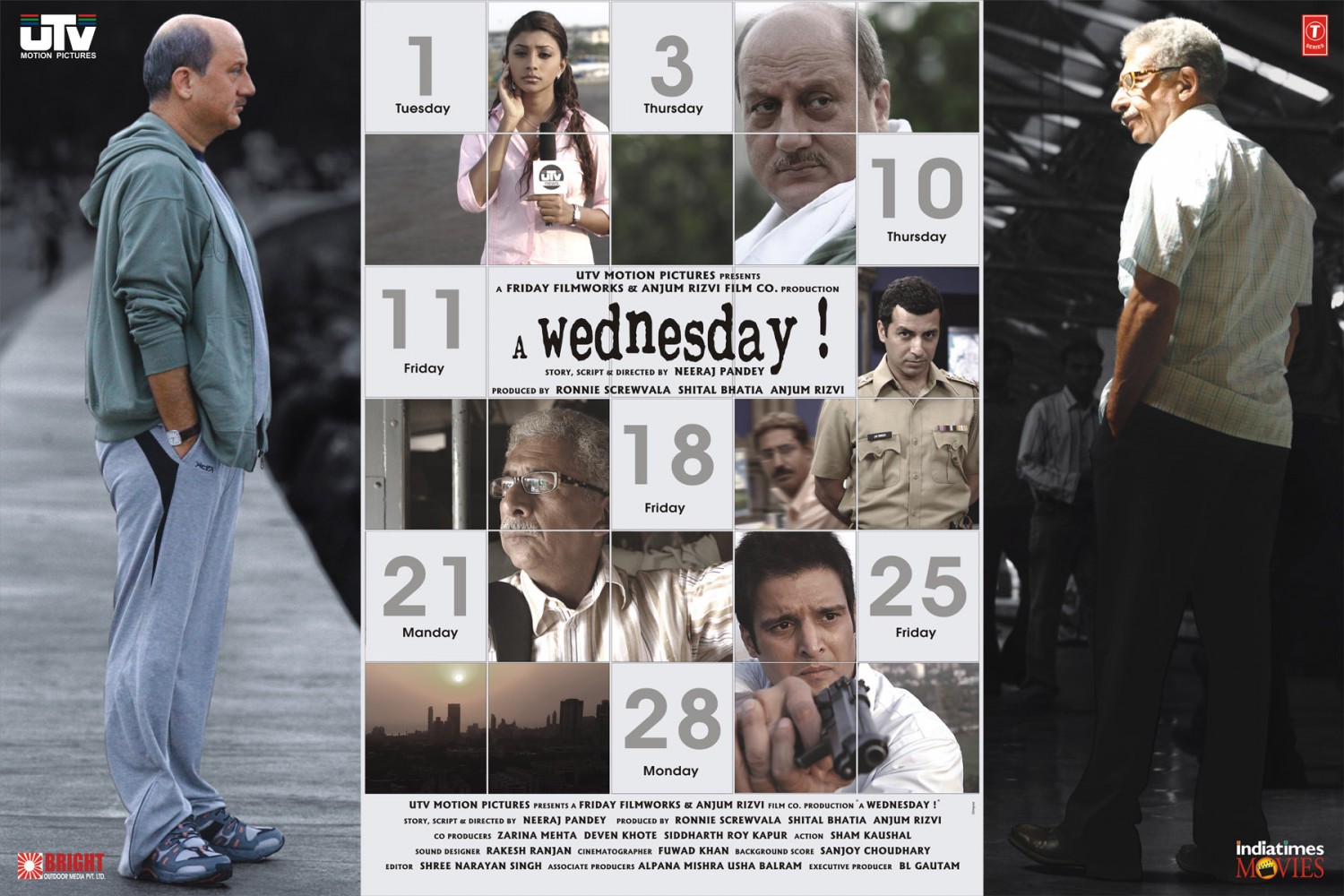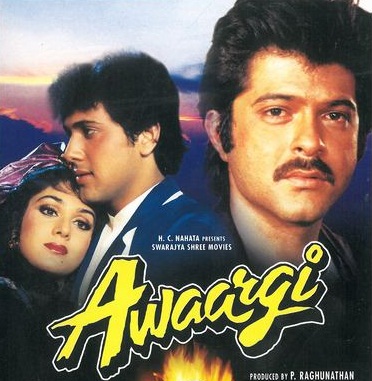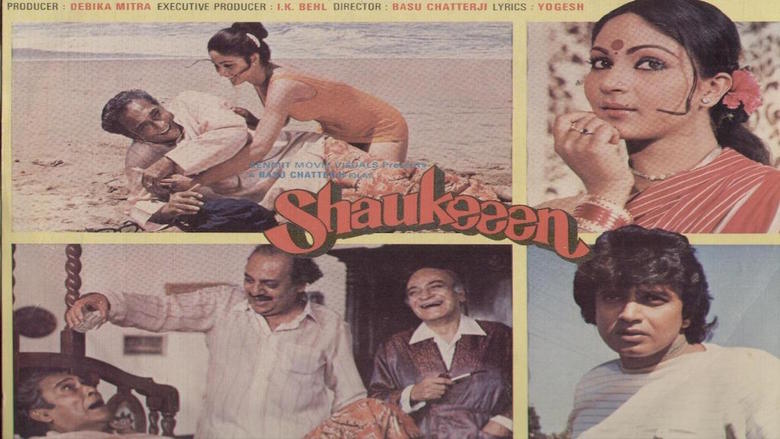All style, no substance. That’ what A Wednesday is. It has the captivating speed, taut packaging and a very sleek, elegant look. But scratch the glossy surface, and the veneer of realism gives way to reveal a flimsy fantasy tale much in the league of Harry potter and Lord of the Rings. The only difference is that both of the hugely successful fantasy series have their internal logic intact. A Wednesday asks you to step inside the theatre and have no recollection of the way the world works outside. Not just that; you are also supposed to believe all that the director asks you to believe. In other words, he needs a complete suspension of disbelief, and would still ask rather innocently, “Suspension of disbelief – Really?” (See the interview).
The movie starts with a pensive Police Commissioner sitting by the seaside reflecting back upon his life as the top cop of Mumbai and recalling the most interesting case of his entire career. It’s a case that has no record anywhere except in his memory. The statement underlining the lack of record is hammered home twice – once in the opening sequence and later towards the end. And the case that has no record is the one in which one man holds the whole of Mumbai to ransom, the Police Commissioner chooses to call in the Chief Minister, the terrorists belonging to organized such dreaded terror groups like Al-Qaueda and Laskar-E-Taiba are forced to be released and are later blown to bits. And all of this is covered live by a television channel. But still there is no record of the case. The Police Commissioner hands over the transfer orders of the jailed terrorists to the officers entrusted with executing the transfer. But there is no record of the case. The jail authorities hand over the prisoners, and there is still no record of the case. Irrespective of whether the terrorists are undertrial detainees or convicted felons, to release such dangerous elements the jail authorities would demand an express permission in writing from the Home Ministry itself. And nothing less would do because if they settled for anything less, the courts would ensure that none of the jail authorities together with the Police Commissioner actually ‘retired’. They would end up being dismissed without pension. But there is still no record. And director Pandey insists that it’s no ‘suspension of disbelief’. Very well.
 And then there is this projected layman who proudly calls himself ‘a stupid common man’. This fellow has the resources and connections to procure RDX and also the technical competence to use it for remote-controlled bombing. Explaining it, the protagonist, brilliantly played by Naseeruddin Shah, says that there are hundreds of websites on the internet to assist a bomb-maker and that even detergent cake is a potential bomb. Well, every single atom around us is a potential atom bomb. Knowledge is not enough. But then, Neeraj Pandey’s ‘common man’ is so extraordinarily uncommon and his ‘stupidity’ dazzlingly well-thought and meticulously executed. But that’s absolutely nothing compared to the far greater liberties the director takes with the reality of our times.
And then there is this projected layman who proudly calls himself ‘a stupid common man’. This fellow has the resources and connections to procure RDX and also the technical competence to use it for remote-controlled bombing. Explaining it, the protagonist, brilliantly played by Naseeruddin Shah, says that there are hundreds of websites on the internet to assist a bomb-maker and that even detergent cake is a potential bomb. Well, every single atom around us is a potential atom bomb. Knowledge is not enough. But then, Neeraj Pandey’s ‘common man’ is so extraordinarily uncommon and his ‘stupidity’ dazzlingly well-thought and meticulously executed. But that’s absolutely nothing compared to the far greater liberties the director takes with the reality of our times.
The way the movie treats and looks at terrorism is criminally innocent. Terrorism is certainly not a law and order or criminal justice problem like organized crime or drug trafficking, which is why the solution does not lie in the application of brute force. And using the same methods to deal with terrorism as used against regular crimes and criminals is like subjecting a patient to blind treatment with wrong drugs without proper diagnosis. AndA Wednesday prescribes a quack’s medicine for a highly complex and lethal affliction that is in dire need of a systematic and phased treatment.
 Terrorism is a multifaceted, multilayered, hydra-headed monster that draws its lifeblood from local socio-political reality viewed against the national and international backdrop. Mindless use of force is not the solution but part of the problem. The movie stubbornly refuses to delve any deeper than the cutting edge of the sword. Its awareness is limited to the damage done by the slashing sword, the open wound and the consequent fear. And it seeks only to deal with the edge of the sword without even looking at the hand that holds it or the motives that drive the hand. Deterrent force is the movie’s answer to terror attacks. Wrong answer. Deterrence works best against those conventional crimes that have money and greed at the core. But when it’s about honour, justice, or religious, political or cultural identity, the use of deterrence force can only add fuel to fire. In such situations a clampdown is likely to be seen as a tyrant’s attempt to stomp out rebellion. When state moves swift and hard using disproportionate force to strike out an uncomfortable uprising, it looks fearful, out of control and weak not only to the enemy but also to its own people. Force, therefore, is certainly not the answer. And we know it from experience.
Terrorism is a multifaceted, multilayered, hydra-headed monster that draws its lifeblood from local socio-political reality viewed against the national and international backdrop. Mindless use of force is not the solution but part of the problem. The movie stubbornly refuses to delve any deeper than the cutting edge of the sword. Its awareness is limited to the damage done by the slashing sword, the open wound and the consequent fear. And it seeks only to deal with the edge of the sword without even looking at the hand that holds it or the motives that drive the hand. Deterrent force is the movie’s answer to terror attacks. Wrong answer. Deterrence works best against those conventional crimes that have money and greed at the core. But when it’s about honour, justice, or religious, political or cultural identity, the use of deterrence force can only add fuel to fire. In such situations a clampdown is likely to be seen as a tyrant’s attempt to stomp out rebellion. When state moves swift and hard using disproportionate force to strike out an uncomfortable uprising, it looks fearful, out of control and weak not only to the enemy but also to its own people. Force, therefore, is certainly not the answer. And we know it from experience.
But writer-director Neeraj Pandey takes no lessons and prescribes poison for a cure. A Wednesday appeared so astonishingly naïve in its understanding of terrorism that I took the unprecedented step of asking Mr. Pandey if he really meant what his movie appeared to convey. And in an e-mail interview, through his very brief responses, he confirmed that he saw terrorism as a criminal-justice problem and to his mind a harder clampdown was needed.
What greater force can there be than that used in Afghanistan? And how much more powerful could one be than the world’s mightiest superpower? Besides, India doesn’t have it as easy as the US had. The US is battling an external enemy while we have our own turned against us. The US is paying the price of its shortsighted foreign policies whereas we have our internal, communal politics to blame. They bred them outside, we did it in-house. And if blowing the enemy is the solution, they’ll have ‘explosions’ and we ‘implosions’. So, if we go after this phantom enemy and kill it, the ‘difference’ would be the same as between ‘murder’ and ‘suicide’. Any clearer, Mr. Pandey?
Originally written for and published in LAWYERS UPDATE as Legal Scanner (October 2008 issue)






